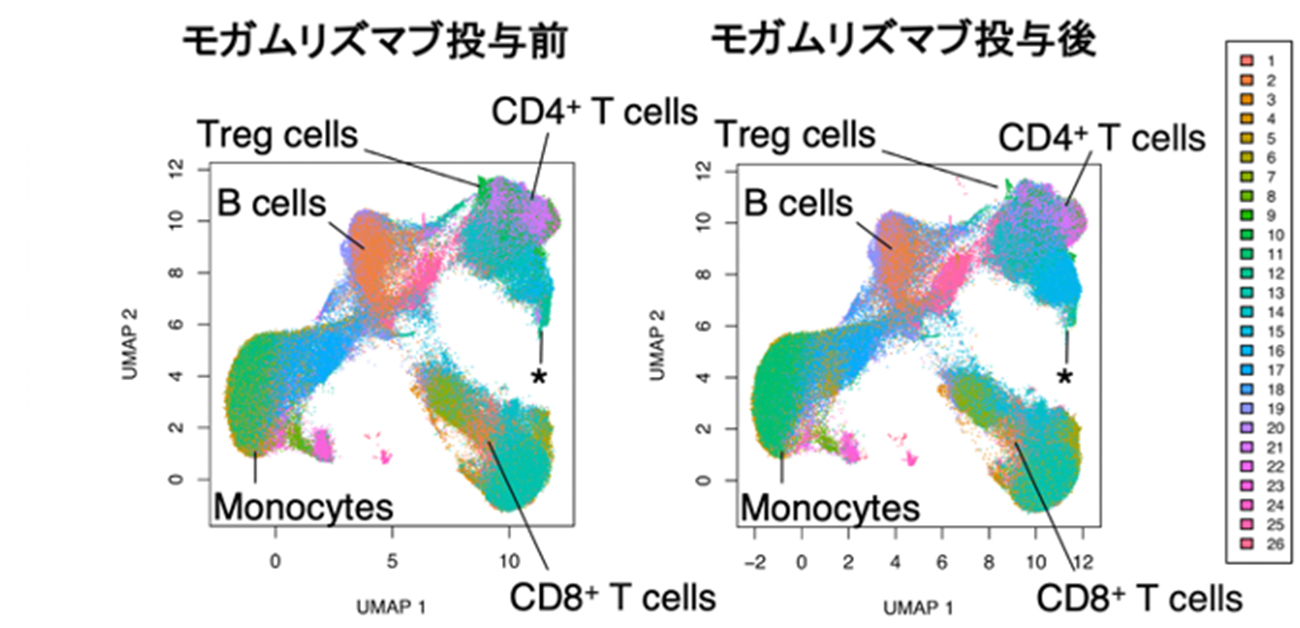
Depletion of central memory CD8+T cells might impede the antitumor therapeutic effect of Mogamulizumab
- In a phase I study (NCT01929486) with an anti-CCR4 monoclonal antibody (mogamulizumab) in solid tumors to deplete regulatory T cells that suppress immune responses, limited anti-tumor activity was observed despite a decrease of Treg cells in peripheral blood.
- Comprehensive immune-monitoring revealed that patients who achieved long-term survival with mogamulizumab treatment possessed high levels of central memory CD8+ T cells, which are reportedly important for anti-tumor immune responses.
- Modulating the dose of mogamulizumab could enhance the anti-tumor immune response through selective depletion of Treg cells that highly expressed CCR4 while preserving central memory CD8+ T cells, leading to therapeutic response.
- Reducing the dosage of reagent could improve the specificity of target cells and lead to a better therapeutic effect, which is an important finding when considering the optimal dosage of cancer immunotherapy.
Summary
Regulatory T (Treg) cells are important negative regulators of immune homeostasis, but in cancers they prevent the anti-tumor immune response. As they harbor high expression levels of the chemokine receptor CCR4, their targeting by the anti-CCR4 monoclonal antibody mogamulizumab holds therapeutic promise. Here, we investigated mogamulizumab with solid cancer patients in phase 1b clinical trial based on the predominant detection of CCR4-expressing effector Treg (eTreg) cells in tumors. While eTreg cells in peripheral blood were significantly decreased after mogamulizumab administration in all patients, clinical responses were hardly detected. Comprehensive immune-monitoring revealed that concomitant reduction of central memory CD8+ T cells with CCR4 expression, that reportedly play important roles in antitumor activity. This reduction was subsided in long survivors in whom central memory CD8+ T cells possessed lower CCR4 expression and/or NK cells exhibited an exhausted phenotype. Thus, excess doses of mogamulizumab harboring enhanced antibody-dependent cellular cytotoxicity could unexpectedly deplete central memory CD8+ T cells with CCR4 expression. We therefore need to carefully determine the optimal dose of mogamulizumab for successful clinical application as cancer immunotherapy to avoid unexpected depletion of effector components.
Publication
Journal name:Nature Communications
Title: Depletion of central memory CD8+T cells might impede the antitumor therapeutic effect of Mogamulizumab
Authors: Yuka Maeda, Hisashi Wada, Daisuke Sugiyama, Takuro Saito, Takumi Irie, Kota Itahashi, Kodai Minoura, Susumu Suzuki, Takashi Kojima, Kazuhiro Kakimi, Jun Nakajima, Takeru Funakoshi, Shinsuke Iida, Mikio Oka, Teppai Shimamura, Toshihiko Doi, Yuichiro Doki, Eiichi Nakayama, Ryuzo Ueda & Hiroyoshi Nishikawa
DOI: 10.1038/s41467-021-27574-0
URL: https://www.nature.com/articles/s41467-021-27574-0
Publication date: 14 December, 2021
